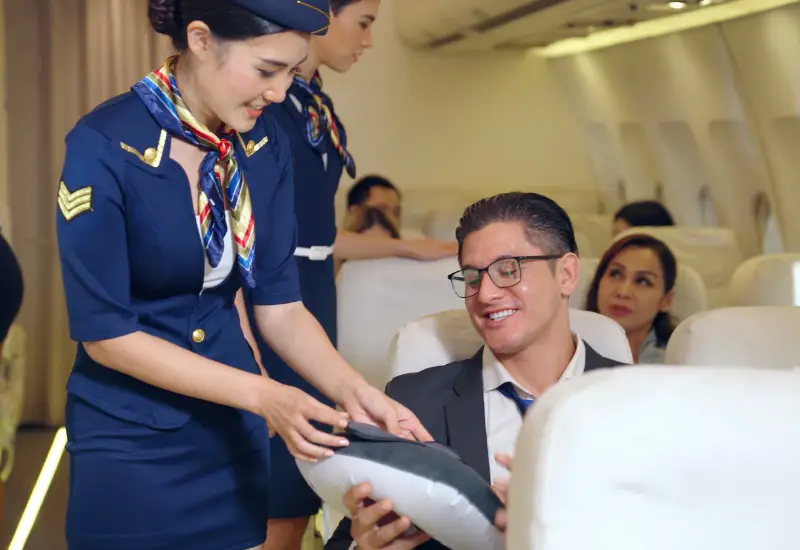Having the ability to speak more than one language is a beneficial skill to have in life whether you are a flight attendant or not.
However, is it necessary in order to become a flight attendant?
If you want to become a flight attendant for an airline that flies for an English-speaking country, then the short answer is no (i.e. Delta, United, American and such flies for the English speaking country United States).
If you want to become a flight attendant in a non-English speaking country such as Japan, then you need to speak not only English but speak their national language Japanese.
This article will focus on the topic of multilingual skills for flight attendants who fly for an English-speaking country.
Advantages of Speaking Multiple Languages as a Flight Attendant
There are many advantages of speaking more than one language as a flight attendant.
➡️ First and foremost, it would be your increased opportunity to become one. Airlines will post job openings with specific language qualification requirements and without language requirements.
For example, if they have an opening for a Greek speaking individual and another for no language requirement, you can apply for both (if you speak Greek) and increase your chances of getting hired.
If they have an opening for Italian speaker as well (and you speak Italian too), then you can apply to all three to increase your chances more.
Even if you are unsure of your level of fluency, apply first because the test to measure your skills will come AFTER the interviews to see if you’re a fit for the airline.
➡️ Another benefit of being multilingual as a flight attendant is that you have the opportunity to make more money.
The system may be different for each airline, but at American Airlines, speaker flight attendants make $2.00 more per hour being the designated speaker on the international flight of their qualified language.
It’s no use if you’re a Spanish speaker going to France, but only if you’re a designated French speaker going to France.
Also, there is a number of speaker flight attendants required on these flights, the speaker flight attendant positions are delegated separately to solely speakers.
This means that instead of this position being available to thousands of flight attendants, it’s only available to a couple of hundred speaker flight attendants, making them more accessible to junior speaker flight attendants.
It can increase their opportunity to fly to an international destination.
Disadvantages of Speaking Multiple Languages as a Flight Attendant
Believe it or not, there are some disadvantages of being qualified as a speaker flight attendant.
➡️ First, you might get stuck doing the same international destination all the time.
If you’re a Hebrew speaker and the airline is short on Hebrew speakers then they will only assign you flights to Israel.
You can be stuck doing it for months at a time…
➡️ Another would be when the airline restricts your schedule so that you are available to serve on reserve around the time of a specific international departure.
If that said flight to Israel is at 4am, they will have to serve reserve around the same time.
Languages in Big Demand as a Flight Attendant
This is a tricky question to answer because the whole paradigm has changed after the pandemic.
Before the pandemic, Chinese would have been one of the most in demand language for flight attendants, but because of the restrictions and political tension between the US and China, it has since died down.
Also, international travel has not fully recovered to pre-pandemic level for various reasons (delays in aircraft deliveries, PCR testing, less business travelers, and etcetera) so taking a guess to which language will be back in demand especially when each airline has a different outlook on where to expand if difficult.
As a general knowledge though, United Airlines has big presence in Asia and American Airlines has a big presence in South America so Far East Asian languages such as Japanese, Chinese, and Korean and Latin-based languages such as Spanish and Portuguese will more or less be constantly needed by the airlines.
The demand for language skills can be quite volatile so constantly check airline job boards to see if they have an opening for your skilled language.
Do You Need to Take a Language Test? What Level of Proficiency is Required?
Yes, airlines do test for language proficiency.
Most tests are done over the phone, with or without a supervisor, and don’t take too long.
It varies by airlines, but they usually consist of reading a PA (passenger/public announcement) and scenario based dialogue.
You will need to be able to speak clearly and fluently in order to pass (and be knowledgeable of hierarchical customer service language that is very important in the case of Japanese, Korean, and such) but it can also vary by proctors.
There was a native Puerto Rican flight attendant who tested for Spanish but failed because the proctor was from a different region and deemed her Spanish insufficient…
So even if you fail, don’t be too heartbroken because you might still have the chance to make it as a non-speaker flight attendant, and if you wish to, give it another shot to qualify after you become one.
Do Flight Attendants Need to Speak Perfect English?
No, you don’t have to speak perfect English in order to become a flight attendant.
It can make some of your duties more difficult (becoming self-conscious when making PAs or panicking when relaying information especially in emergency situations) but all is possible and have been done.
The airline industry, especially in the US, prides itself on their diversity. As long as clear communication and understanding are met to perform your duty functions, then perfection is unnecessary.
Conclusion
Speaking multiple languages is a great benefit to have that can also boost your chances of becoming a flight attendant.
It is not mandatory, and it can also open opportunities that may not be available until you reach certain seniority.
However, kindness and the ability to provide a great customer experience trumps any language skills you may have so make sure to work on your customer service first!




